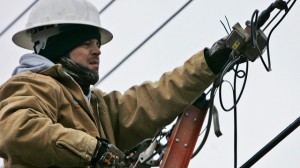
If you’re an American who lives in the middle of nowhere and you want phone and Internet service, you can pretty much have them, albeit in their least sexy form. That’s right, we’re talking about old-fashioned landlines for the phone and (shudder!) dial-up for the Internet. Hyper-wired, connected citizens have long since relegated those services to the dustbin of tech history. But for people living in remote areas (or some low-income neighborhoods), landlines and dial-up are still the lifeblood of telecommunications. Take them away, and you’re sending people back to the Stone Age of telecommunications.
But taking them away is effectively what big telecom companies — companies like AT&T to be specific — may well end up doing if they have their way.

A repairman fixes wires to restore telephone, cable and Internet service to a customer in Oklahoma. Roughly 19 million Americans depend on wires for their telephone and Internet service. (AP Photo)
First, a little background. Thanks to a mix of federal and state standards and mandates, even the poorest and remotest among us must receive what collectively are called “wireline” services, telephone and Internet provided via cords that come out of your wall and connect to your devices the old-fashioned way. They aren’t cool, but they work. And they keep many Americans connected.
So when AT&T filed a petition last year with the FCC asking to get out from under regulations and lay its wireline services to rest, it meant trouble for those who rely on them.
But the federal petition is but the most visible part of the strategy. AT&T has been playing a long game, flying under the radar at the state level. How? With the help of ALEC — the American Legislative Exchange Council — of which AT&T appears to be a devoted member. (Not only does an AT&T representative sit on the group’s Private Enterprise Advisory Board, AT&T sponsored ALEC’s most recent conference, the Spring Task Force Summit in Oklahoma City.) Published on ALEC’s website are at least four model bills and statements echoing AT&T’s position on telecommunications regulations — briefly, that there should be little to none.
Chief among the model bills are ALEC’s Regulatory Modernization Act, which allows service providers to elect whether or not they would like to partake in state regulation, which is a little like asking students to elect whether or not they would like to partake in homework. The bill was approved by ALEC’s board of directors in 2009. In the ensuing three years, according to a 2010-2012 “Telecommunications Deregulation” report issued by the National Regulatory Research Institute (NRRI), more than 30 states have considered and/or passed laws eliminating or restricting government oversight and basic service requirements. Florida, Georgia, Illinois, Michigan, Mississippi, North Carolina and Wisconsin are just a few to have passed deregulation legislation in the past three years. In each of these states, AT&T is a primary service provider. And in each of these states, a confirmed ALEC member was responsible for introducing the bill.
ALEC publicly endorsed AT&T’s petition this year, submitting public comments to the FCC, which read, in part, that it “believes public policy should become neutral with respect to existing and emerging business models and technologies in the burgeoning broadband ecosystem. Moreover, policy responses should seek to preserve organic market forces and not attempt to replace them with regulatory fiat.” Translation: companies should have the right to do what they want in pursuit of profits. The problem with that, as Jessica Gonzalez, vice president of policy and legal affairs at The National Hispanic Media Coalition told The Nation magazine, is that “it is often the underserved and hardest to reach that are left out when profit maximization is the only consideration driving investment decisions.”
In May, the FCC granted AT&T’s petition. It will begin to “move forward with real-world trials” — promoting the transition from wireline to wireless services – shortly. As for those who will be left with no phone or Internet service? One supposes they’ll just have to write their congressperson, the old-fashioned way. They certainly won’t be able to call and complain.

